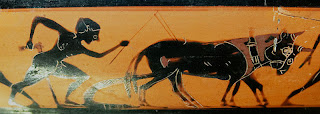The Lonely American is a favorite nonfiction book of mine, in large part because it makes intelligent use of myth. Olds and Schwartz begin by deconstructing the myths surrounding independence and productivity in American culture, and return to that theme throughout the book.
"Productivity is a virtue in America. Busyness itself is a virtue in America. And because busyness is virtuous, it has "legs." When necessity recedes, the busyness does not stop. It continues not only because it is a habit but because it is a "good" habit. And since busyness is a public virtue, a boast as well as a complaint, since people want to be seen as virtuous even in those moments when their virtues are flagging, they sometimes present a facade of busyness to the world whether they are being productive or not." (14-15)
I"m always trying to get my myth students to look at the relevance of Greek myths in ancient life (however reluctant they sometimes are). So I'm wondering what myths had a consistently negative effect on life in the ancient world. I'm going to do a little reading in De Officiis and Works and Days, and post an update.

No comments:
Post a Comment